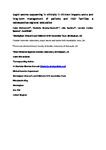Rapid exome sequencing in critically ill children impacts acute and long-term management of patients and their families: a retrospective regional evaluation
| dc.contributor.author | Baptista, Julia | |
| dc.date.accessioned | 2022-07-12T09:37:43Z | |
| dc.date.issued | 2022-09 | |
| dc.identifier.issn | 1769-7212 | |
| dc.identifier.issn | 1878-0849 | |
| dc.identifier.other | 104571 | |
| dc.identifier.uri | http://hdl.handle.net/10026.1/19407 | |
| dc.description | File replaced (incorrect version) on 12/7/22 by KT (LDS). | |
| dc.description.abstract |
INTRODUCTION: Genetic disorders are a significant cause of paediatric morbidity and mortality. Rapid exome sequencing was introduced by the National Health Service (NHS) in England on 1st October 2019 for acutely unwell children with a likely monogenic disorder, or to inform current pregnancy management where there was a previously affected child or fetus. We present results of a 12-month patient cohort from one large clinical genetics centre in England. METHODS: Patients were identified through local genetics laboratory records. We included all cases which underwent rapid exome sequencing between 1st October 2020 and 30th September 2021. DNA was extracted, quality checked and exported to the Exeter Genomic laboratory where library preparation, exome sequencing of all known human genes, gene-agnostic bioinformatic analysis, variant interpretation, MDT discussions and reporting were performed. RESULTS: Ninety-five probands were included. Trio analysis was performed in 90% (85), duo in 8% (8), singleton in 2% (2). The median turnaround time for preliminary reports was 11 days. The overall diagnostic yield was 40% (38 patients); 36% (34 patients) made solely on exome with a further 4% on concomitant exome and microarray analysis. Highest diagnostic rates were seen in patients with neuro-regression, skeletal dysplasia, neuromuscular and neurometabolic conditions. Where the diagnosis was made solely through exome sequencing, management was altered for the proband or family in 97% (33/34). For the proband, this was most commonly that the diagnosis was able to inform current management and prognosis (20 patients, 59%), as well as direct specialist referrals (10 patients, 29%). For families, the exome sequencing results provided accurate recurrence risk counselling in 88% (30/34) with cascade testing offered if indicated in some families. CONCLUSIONS: In the majority of cases, the genetic diagnoses influenced acute and long-term management for critically ill children and their families. Paediatric and neonatal clinicians in the NHS now have direct access to exome sequencing for their patients. The rapid turnaround time was particularly helpful to alter the management in acute clinical settings and is a powerful tool for diagnosing monogenic conditions. This study is an example of a highly successful integration of a national rapid exome sequencing service with diagnostic rates comparable to previously reported literature. | |
| dc.format.extent | 104571-104571 | |
| dc.format.medium | Print-Electronic | |
| dc.language | en | |
| dc.language.iso | en | |
| dc.publisher | Elsevier | |
| dc.subject | Diagnosis | |
| dc.subject | Genetic disease | |
| dc.subject | inborn | |
| dc.subject | National health program | |
| dc.subject | Time factors | |
| dc.subject | Whole exome sequencing | |
| dc.title | Rapid exome sequencing in critically ill children impacts acute and long-term management of patients and their families: a retrospective regional evaluation | |
| dc.type | journal-article | |
| dc.type | Journal Article | |
| plymouth.author-url | https://www.webofscience.com/api/gateway?GWVersion=2&SrcApp=PARTNER_APP&SrcAuth=LinksAMR&KeyUT=WOS:000831030500005&DestLinkType=FullRecord&DestApp=ALL_WOS&UsrCustomerID=11bb513d99f797142bcfeffcc58ea008 | |
| plymouth.issue | 9 | |
| plymouth.volume | 65 | |
| plymouth.publication-status | Published | |
| plymouth.journal | European Journal of Medical Genetics | |
| dc.identifier.doi | 10.1016/j.ejmg.2022.104571 | |
| plymouth.organisational-group | /Plymouth | |
| plymouth.organisational-group | /Plymouth/Faculty of Health | |
| plymouth.organisational-group | /Plymouth/Faculty of Health/Peninsula Medical School | |
| plymouth.organisational-group | /Plymouth/Users by role | |
| plymouth.organisational-group | /Plymouth/Users by role/Academics | |
| dc.publisher.place | Netherlands | |
| dcterms.dateAccepted | 2022-07-10 | |
| dc.rights.embargodate | 2023-7-14 | |
| dc.identifier.eissn | 1878-0849 | |
| dc.rights.embargoperiod | Not known | |
| rioxxterms.versionofrecord | 10.1016/j.ejmg.2022.104571 | |
| rioxxterms.licenseref.uri | http://www.rioxx.net/licenses/all-rights-reserved | |
| rioxxterms.type | Journal Article/Review |


